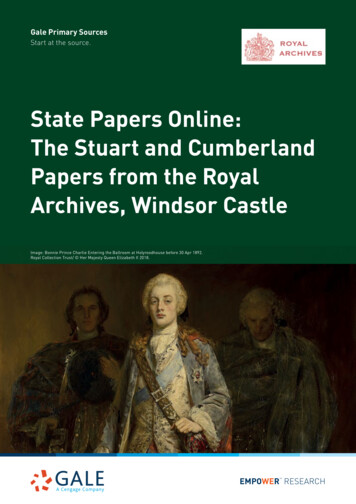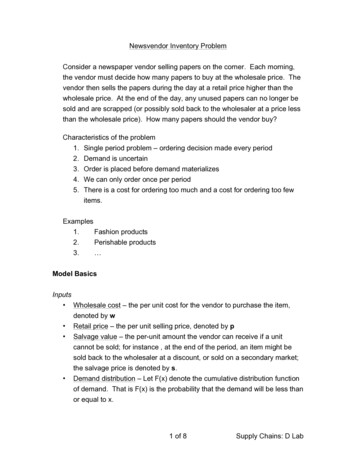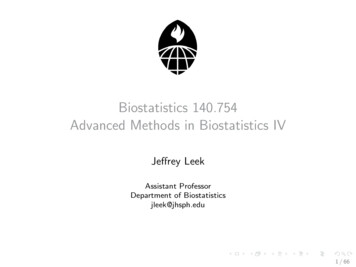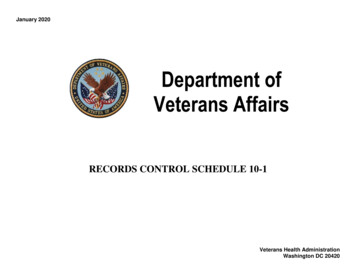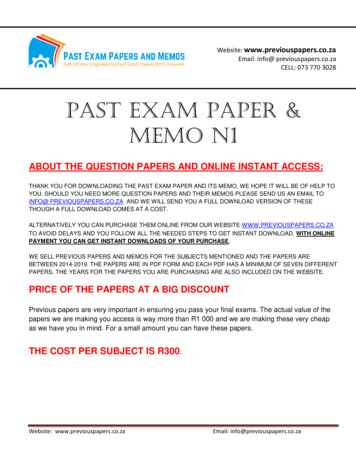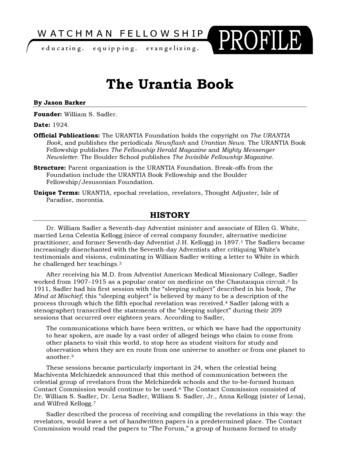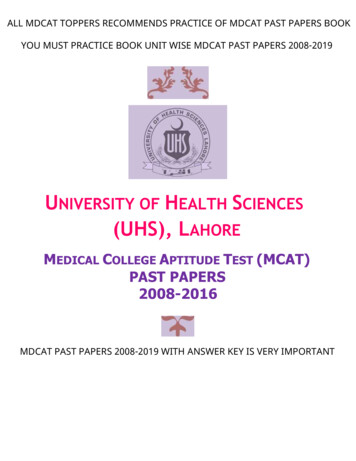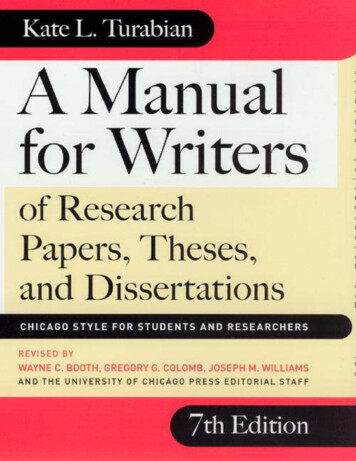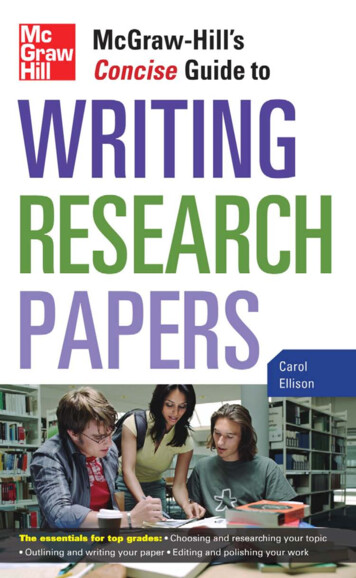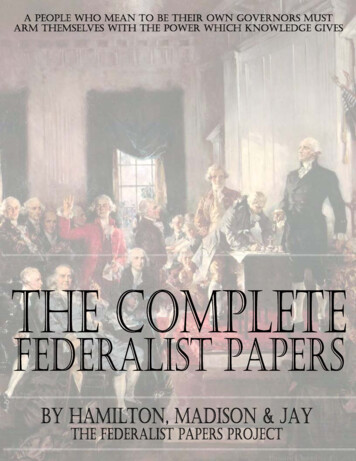
Transcription
THE FEDERALIST PAPERSEdited by Bill BaileyThe Federalist Papers Projectwww.thefederalistpapers.org
THE FEDERALIST PAPERSTable of ContentsIntroduction . 7The Federalist Papers: America’s Political Classic . 8Federalist No. 1 - General Introduction . 18Federalist No. 2 - Concerning Dangers from Foreign Force and Influence . 21Federalist No. 3 - Concerning Dangers from Foreign Force and Influence (continued) . 25Federalist No. 4 - Concerning Dangers from Foreign Force and Influence (continued) . 28Federalist No. 5 - Concerning Dangers from Foreign Force and Influence (continued) . 32Federalist No. 6 - Concerning Dangers from Dissensions Between the States . 35Federalist No. 7 - Concerning Dangers from Dissensions Between the States (continued) andParticular Causes Enumerated . 40Federalist No. 8 - Consequences of Hostilities Between the States . 44Federalist No. 9 - The Utility of the Union as a Safeguard Against Domestic Faction andInsurrection . 48Federalist No. 10 - The Utility of the Union as a Safeguard Against Domestic Faction andInsurrection (continued) . 52Federalist No. 11 - The Utility of the Union in Respect to Commercial Relations and a Navy . 58Federalist No. 12 - The Utility of the Union In Respect to Revenue. 63Federalist No. 13 - Advantage of the Union in Respect to Economy in Government . 67Federalist No. 14 - Objections to the Proposed Constitution From Extent of Territory Answered. 69Federalist No. 15 - Insufficiency of the Present Confederation to Preserve the Union . 73Federalist No. 16 - Insufficiency of the Present Confederation to Preserve the Union (continued). 79Federalist No. 17 - Insufficiency of the Present Confederation to Preserve the Union (continued). 83Federalist No. 18 - Insufficiency of the Present Confederation to Preserve the Union (continued). 87Federalist No. 19 - Insufficiency of the Present Confederation to Preserve the Union (continued). 92www.thefederalistpapers.orgPage 2
THE FEDERALIST PAPERSFederalist No. 20 - Insufficiency of the Present Confederation to Preserve the Union (continued). 96Federalist No. 21 - Other Defects of the Present Confederation . 100Federalist No. 22 - Other Defects of the Present Confederation (continued) . 104Federalist No. 23 - Necessity of a Government as Energetic as the One Proposed to thePreservation of the Union . 110Federalist No. 24 - Powers Necessary to the Common Defense Further Considered . 114Federalist No. 25 - Powers Necessary to the Common Defense Further Considered (continued). 118Federalist No. 26 - Idea of Restraining the Legislative Authority in Regard to the CommonDefense Considered . 122Federalist No. 27 - Idea of Restraining the Legislative Authority in Regard to the CommonDefense Considered (continued) . 127Federalist No. 28 - Idea of Restraining the Legislative Authority in Regard to the CommonDefense Considered (continued) . 130Federalist No. 29 - Concerning the Militia . 133Federalist No. 30 - Concerning the General Power of Taxation. 137Federalist No. 31 - Concerning the General Power of Taxation (continued) . 141Federalist No. 32 - Concerning the General Power of Taxation (continued) . 145Federalist No. 33 - Concerning the General Power of Taxation (continued) . 148Federalist No. 34 - Concerning the General Power of Taxation (continued) . 151Federalist No. 35 - Concerning the General Power of Taxation (continued) . 155Federalist No. 36 - Concerning the General Power of Taxation (continued) . 159Federalist No. 37 - Concerning the Difficulties of the Convention in Devising a Proper Form ofGovernment. 165Federalist No. 38 - The Same Subject Continued, and the Incoherence of the Objections to theNew Plan Exposed . 170Federalist No. 39 - Conformity of the Plan to Republican Principles . 176Federalist No. 40 - On the Powers of the Convention to Form a Mixed Government Examinedand Sustained . 181Federalist No. 41 - General View of the Powers Conferred by The Constitution . 187www.thefederalistpapers.orgPage 3
THE FEDERALIST PAPERSFederalist No. 42 - The Powers Conferred by the Constitution Further Considered . 194Federalist No. 43 - The Powers Conferred by the Constitution Further Considered (continued). 199Federalist No. 44 - Restrictions on the Authority of the Several States . 206Federalist No. 45 - Alleged Danger From the Powers of the Union to the State GovernmentsConsidered . 212Federalist No. 46 - The Influence of the State and Federal Governments Compared . 216Federalist No. 47 - The Particular Structure of the New Government and the Distribution ofPower Among Its Different Parts . 221Federalist No. 48 - These Departments Should Not Be So Far Separated as to Have NoConstitutional Control Over Each Other. 227Federalist No. 49 - Method of Guarding Against the Encroachments of Any One Department ofGovernment by Appealing to the People Through a Convention . 231Federalist No. 50 - Periodical Appeals to the People Considered . 235Federalist No. 51 - The Structure of the Government Must Furnish the Proper Checks andBalances Between the Different Departments . 238Federalist No. 52 - The House of Representatives . 242Federalist No. 53 - The House of Representatives (continued) . 246Federalist No. 54 - Apportionment of Members of the House of Representatives Among theStates . 250Federalist No. 55 - The Total Number of the House of Representatives . 254Federalist No. 56 - The Total Number of the House of Representatives (continued) . 258Federalist No. 57 - The Alleged Tendency of the New Plan to Elevate the Few at the Expense ofthe Many Considered in Connection with Representation . 261Federalist No. 58 - Objection That The Number of Members Will Not Be Augmented as theProgress of Population Demands Considered . 266Federalist No. 59 - Concerning the Power of Congress to Regulate the Election of Members . 270Federalist No. 60 - Concerning the Power of Congress to Regulate the Election of Members(continued) . 274Federalist No. 61 - Concerning the Power of Congress to Regulate the Election of Members(continued) . 278www.thefederalistpapers.orgPage 4
THE FEDERALIST PAPERSFederalist No. 62 - The Senate . 281Federalist No. 63 - The Senate (continued) . 286Federalist No. 64 - The Powers of the Senate . 292Federalist No. 65 - The Powers of the Senate (continued) . 296Federalist No. 66 - Objections to the Power of the Senate To Set as a Court for ImpeachmentsFurther Considered. 300Federalist No. 67 - The Executive Department . 304Federalist No. 68 - The Mode of Electing the President. 307Federalist No. 69 - The Real Character of the Executive . 310Federalist No. 70 - The Executive Department Further Considered . 315Federalist No. 71 - The Duration in Office of the Executive. 321Federalist No. 72 - The Same Subject Continued, and Re-Eligibility of the Executive Considered. 324Federalist No. 73 - The Provision For The Support of the Executive, and the Veto Power . 328Federalist No. 74 - The Command of the Military and Naval Forces, and the Pardoning Power ofthe Executive. 333Federalist No. 75 - The Treaty-Making Power of the Executive . 335Federalist No. 76 - The Appointing Power of the Executive . 339Federalist No. 77 - The Appointing Power Continued and Other Powers of the ExecutiveConsidered . 343Federalist No. 78 - The Judiciary Department . 347Federalist No. 79 - The Judiciary Continued . 353Federalist No. 80 - The Powers of the Judiciary. 355Federalist No. 81 - The Judiciary Continued, and the Distribution of the Judicial Authority . 360Federalist No. 82 - The Judiciary Continued . 367Federalist No. 83 - The Judiciary Continued in Relation to Trial by Jury. 370Federalist No. 84 - Certain General and Miscellaneous Objections to the Constitution Consideredand Answered. 380Federalist No. 85 - Concluding Remarks . 387Appendix 1 - The Federalist - Questions and Answers . 392www.thefederalistpapers.orgPage 5
THE FEDERALIST PAPERSAppendix 2 - Glossary of Terms . 395www.thefederalistpapers.orgPage 6
THE FEDERALIST PAPERSIntroductionThe Federalist is a treatise on free government in peace and security. It is the outstandingAmerican contribution to the literature on constitutional democracy and federalism, a classic ofWestern political thought. It is, by far, the most authoritative text concerning the interpretation ofthe American Constitution and an insight into the framer's intent in the constitution.Although Hamilton carefully outlined the contents of The Federalist at the end of the first essay,in reality, he strayed a bit from his original proposition. In the end, the work of primarilyMadison and Hamilton can be divided into two principle parts; the first discussing the defects ofthe present government, the Articles of Confederation, and the second discussing the newconstitutions different components, the legislature, executive, and judicial branches.The Federalist was written in order to secure the ratification of a constitution providing for amore perfect union. Throughout the papers, the idea of the more perfect Union occupies a frontstage. On first glance, this might be the primary purpose of the papers but indeed, The Federalistpapers are concerned with much more. "Union" and the "safety and welfare of the parts of whichit is composed" are depicted as inseparable, and the Union appears as a means to achieve thesafety and welfare of its parts. In general, then, the Federalists discuses federalism as a means toachieve free government in peace and security as well as the nonexistence of federalism underthe Articles of Confederation and its achievement under the Constitution.The Federalist deals with not only the practical, but also the theoretical, something thatdistinguishes this from other works. In a letter to his nephew Thomas Mann Randolph, ThomasJefferson distinguished The Federalist from the theoretical writings of Locke when he writes,after discussing Locke's philosophy: "Descending from theory to practice, there can be no betterbook than The Federalist." The authors, however, never considered their work a mere treatise ongovernmental practice. In their essays, a distinction between theory and practice is often drawn."Theoretical reasoning must be qualified by the lessons of practice," Madison writes, and he alsostates that the Philadelphia Convention "must have been compelled to sacrifice theoreticalprosperity to the force of extraneous consideration."Five basic themes can be discerned from the words of Hamilton, Madison, and Jay, includingfederalism, checks and balances, separated powers, pluralism, and representation. Although theydeal with different parts of the government, as noted above, these themes are fairly consistentthroughout the papers. Much has been written concerning the dual nature of the federalist,because they were written by multiple authors in a short amount of time. It is true, Madison laterbecame the great state rights' defenders while Hamilton his principle opponent, but for the mostpart these essays are coherent, showing all sides of the proposed constitution.www.thefederalistpapers.orgPage 7
THE FEDERALIST PAPERSThe Federalist Papers: America’s Political ClassicQuentin TaylorResident Scholar Liberty Fund, Inc. Indianapolis, IndianaThe joint work of Alexander Hamilton, James Madison, and John Jay, The Federalist paperswere written to defend and explain the recently drafted Federal Constitution, and promote itsratification in the state of New York. Published seriatim in New York City newspapers fromOctober 1787 to August 1788, the eighty-five essays appeared under the pseudonym "Publius," alegendary founder of the Roman republic and "friend of the people." If measured by the largemajority of Antifederalists elected to the New York ratifying convention, the project was not asuccess in its immediate aim. Once the Constitution was adopted, however, the papers –collected and bound – were soon recognized as a tour de force of political reasoning and elevatedto the status of a classic. George Washington correctly predicated that The Federalist would"merit the notice of posterity," while Thomas Jefferson called it "the best commentary on theprinciples of government which was ever written." More than two centuries later, it is stillregarded as the leading commentary on the Constitution and America’s greatest contribution topolitical science.Origins and AuthorsThe idea for The Federalist originated with Alexander Hamilton, who tapped fellow New YorkerJohn Jay and Virginia congressman James Madison as collaborators. Jay was the senior memberof the team in years and experience, having served as president of the Continental Congress,envoy to the peace talks that ended the War of Independence, and secretary for foreign affairsunder the Articles of Confederation. Madison had served on a number of important committeesin Congress and was among the leaders of the movement to strengthen the national government.His prominent role at the Federal Convention subsequently earned him the (somewhatmisleading) title of "Father of the Constitution." Hamilton had also been a delegate to theConvention, but his ultranationalist views and irregular attendance limited his influence. LikeMadison, he had been an early and persistent advocate of a stronger central government. At theabortive Annapolis Convention (October 1786), the two co-authored a statement calling for aconvention of states to take up the issue of constitutional reform. In late February 1787,following Shays' Rebellion, Congress authorized delegates of the states to meet at Philadelphiain May to "revise and amend" the Articles of Confederation. While the Convention went wellbeyond its mandate, neither Madison nor Hamilton was fully satisfied with the document theysigned on September 17, 1787. Both, however, vowed to work for its adoption as the best planthat could be obtained under the circumstances.www.thefederalistpapers.orgPage 8
THE FEDERALIST PAPERSThe Plan and the PremisePrompted by growing attacks on the Constitution in the New York press, Publius laid out anambitious plan for a comprehensive response in the first number of The Federalist. The questionbefore the American people entailed "nothing less than the existence of the UNION" and "thefate of an empire." America's unique experiment in republican government had reached a criticaljuncture, and a wrong decision was likely to end in disunion and disaster. According to Publius,the outcome would not only determine the destiny of the United States, but answer the largerquestion raised by the American Revolution: "whether societies of men are really capable or notof establishing good government from reflection and choice"?With the stakes so high Publius shunned the pose of impartiality, and openly declared his"opinion [that] it is your interest to adopt [the Constitution] as the safest course for yourliberty, your dignity, and your happiness." Aware that such a momentous question affecting somany interests was bound to unleash "a torrent of angry and malignant passions," he pledged toprovide a candid and fair appraisal of the Constitution and answer the numerous objections of itsopponents. As a self-styled patriotic voice of reason, Publius sets out six broad propositions thepapers aim to establish: "[1] The utility of the UNION to your political prosperity – [2] Theinsufficiency of the present Confederation to preserve that Union – [3] The necessity of agovernment at least equally energetic with the one proposed, to be attainment of this object – [4]the conformity of the proposed Constitution to the true principles of republican government – [5]Its analogy to your own State constitution — and lastly, [6] The additional security which itsadoption will afford to the preservation of that species of government, to liberty, and toproperty."These divisions provide the basic structure for The Federalist and embody its principalconclusions. Brief headings added to each paper in the first collected edition identify the morespecific topics addressed. For all its length and detail, however, the arguments in The Federalistare guided by two basic assumptions: (1) that the rejection of the Constitution would almostinevitably result in disunion and an end to the republican experiment, and (2) that nothing shortof the government proposed could preserve the Union, and with it the safety and liberty of theAmerican people. The prospect that the nation could survive under the Articles of Confederation(or a strengthened version thereof) is simply not entertained by Publius. He suggests it would bemore likely for the union to dissolve into two or more rival confederacies.The Promise of UnionThe stark nature of this either/or scenario is most evident in the early numbers of The Federalist,where disunion is viewed as the prologue to foreign intrigue, military establishments, and civilwar. Jay, the author of numbers 2 through 5, underscored the natural bases of American union,www.thefederalistpapers.orgPage 9
THE FEDERALIST PAPERSthe "dangers of foreign influence & force," and the advantages of a strong bond. (Jay would fallill in the early stages of the project and only contribute one more paper.) In numbers 6 through 8,Hamilton drew upon history to illustrate the gloomy prospects of a disunited America.Paper nine, also by Hamilton, was the first to address a major criticism of the Constitution anddefend a leading principal upon which it was based. Early in the ratification debate,Antifederalists had invoked the respected Montesquieu to challenge the feasibility of establishinga republic over a large territory. Turning the argument on its head, Hamilton drew upon the samethinker to show that a "confederate republic" is not only possible over an extended territory, butis particularly suited to quelling the peculiar vices of popular government – domestic faction andinsurrection. This was one of those advances in the "science of politics" – the reconciliation of"energetic" government with an extended republic – that rendered the "gloomy sophisms" of thecritics obsolete.Popular Tyranny and the Extended RepublicThe focus on faction, and particularly majority faction, as the bane of popular government is thesubject of number 10, Madison’s first contribution to The Federalist. Faction has many causes,but its most prominent and perennial source is the "various and unequal distribution of property,"which arises from the "diversity in the faculties of men " (Madison's assertion that "[t]heprotection of these faculties is the first function of government, provides a glimpse into whatsome modern scholars have called the class-based assumptions underlying the Constitution.)Since the tendency to faction is "sown in the nature of man," it can only be eradicated at the costof destroying liberty. Controlling its effects, rather than eliminating its causes, is the only courseof action consistent with public liberty. Accordingly, "[t]he regulation of these various andinterfering interests forms the principal task of modern Legislation." Like Hamilton's reversal ofMontesquieu, Madison's assertion that this task "involves the spirit of party and faction in thenecessary and ordinary operations of Government" was at odds with prevailing republicantheory, which viewed the discernment of the public good, rather than the regulation of clashinginterests, as the hallmark of statesmanship. In practice, however, the extended republic embodiedin the Constitution will provide a check against majority tyranny as well as a mechanism forsecuring the public good.On one hand, a large territory will encourage a multiplicity of interests –religious, political,economic – none of which will likely constitute a majority of the whole. If an unjust majority didform, great distances and other barriers will make acting in concert on a large scale difficult. Onthe other hand, the large electoral districts from which the people, directly or indirectly, selecttheir representatives will enhance the prospect of choosing "fit characters" for national office. Inconjunction with federalism – "the great and aggregate interests being referred to the national,www.thefederalistpapers.orgPage 10
THE FEDERALIST PAPERSthe local and particular, to the state legislatures" – an extended republic promises to supply "aRepublican remedy for the diseases most incident to Republican Government."In numbers 11 through 13, Publius outlines the advantages of a firm union in terms of foreigncommerce, revenue, and overall economy. A united people and a respectable navy will work tosecure the nation’s commercial interests, while revenue derived from duties on imports willreduce the need for more direct and unpopular forms of taxation. Finally, the support of a singlenational government will prove more economical and less burdensome than maintaining two orthree separate confederacies. The fourteenth paper, which concludes the first section, providesadditional arguments for the extended republic, including improvements in transportation andcommunication. Publius ends with a rousing appeal to his "fellow countryman," who shouldreject the "unhallowed language" of disunion and trust to "their own good sense, the knowledgeof their own situation, and the lessons of their own experience." While The Federalist is oftenapproached as a work of constitutional theory, such passages reflect the rhetorical idiom andpartisan context in which it was written.The Articles of Confederation: Defects and DangersIn the second division (Nos. 15-22), Publius catalogues the fatal defects of the Articles ofConfederation. Foremost among these is the "great and radical vice" of a Congress that couldlegislate for the states, but left the individual untouched. Moreover, Congress had no power todirectly tax or regulate commerce, nor the means of enforcing its laws. As a result, the states hadrepeatedly defied or evaded its measures to the point of national paralysis and disintegration.Like past and present confederacies whose central authority lacked the basic attributes ofsovereignty, the Articles embodied the "political monster of imperium in imperio," a governmentwithin a government.In addition to these "fundamental errors," Publius judges the Articles defective on a number ofother counts. An equal vote for each state regardless of size, a supermajority for importantlegislation, and unanimity for amendments had proved unfair and unworkable. A unicamerallegislature and the absence of an independent judiciary or executive were at variance withseparation of powers and wholly unsuited to responsible governance. governing the nation.Finally, the Articles, adopted by the regular state legislatures, lacked a firm foundation in theconsent of the American people. For these reasons it was necessary to scrap the Articlesaltogether and frame a constitution on entirely different principles.The nature of these principles, and their necessity for an enduring union, is the subject of thethird section of papers (Nos. 23-36). Here Publius defends the Constitution's provisions for anunlimited power of taxation and a peacetime military establishment on the grounds that "themeans ought to be proportioned to the ends." Given the responsibilities assigned the nationalwww.thefederalistpapers.orgPage 11
THE FEDERALIST PAPERSgovernment, and the incalculable nature of its future needs, a limitation on the taxing power or aprohibition on standing armies would prove impractical and improvident. Publius remindsAntifederalist critics that the states will possess a concurrent power to tax (except on impor
The Federalist is a treatise on free government in peace and security. It is the outstanding American contribution to the literature on constitutional democracy and federalism, a classic of Western political thought. It is, by far, the
